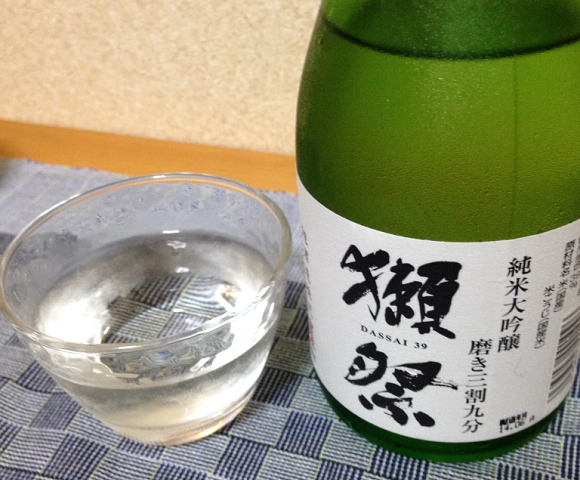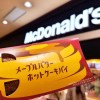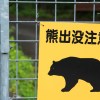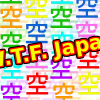
The goal of advertising is usually to increase sales, but for Dassai a love of sake, and customers, is more important.
During college, I spent a good chunk of just about every summer in the town of Iwakuni in Yamaguchi Prefecture, thanks to a generous older brother who lived there and was always willing to give me a place to stay. A lot of my earliest memories of Japan are tied to Iwakuni, and my love for the town only got greater when I became old enough to drink and found out that Iwakuni is also the home of Asahi Shuzo, the brewer that makes the delicious sake Dassai.
I’m not the only one who enjoys Dassai, though, and over the past few years it’s become arguably the most popular sake brand in Japan. At the same time, though, it’s been becoming steadily more expensive. While that’s sort of unavoidable in a free market economy, the rising sale price itself isn’t really making customers happy, and, surprisingly, it isn’t making Asahi Shuzo happy either.
本日(12月10日)、読売新聞の朝刊より。
— たけくま酒店 本店 (@takekumasaketen) December 10, 2017
【お願いです。高く買わないください】
「獺祭」旭酒造社長桜井一宏。
どんな業界にも
【非正規流通】【不正規流通】に、
頭を悩ませている関係者はたくさんいるはずです。
何より最も被害を被る、
消費者のみなさんの利益につながれば良いなと思います!! pic.twitter.com/UFoCFAaSea
On December 10, Asahi Shuzo, which usually doesn’t spend all that much on high-profile advertising, took out a full-page ad in the Yomiuri Shimbun, Japan’s most-circulated newspaper. To the left of a photo of a bottle of Dassai, in large print, are the words:
“A request. Please do not pay a high price for our sake. – Kazuhiro Sakurai, President and CEO, Asahi Shuzo”
It’s an unusual stance for a company to take, but Sakurai believes it’s an important message to send. Like a lot of sake breweries, Asahi Shuzo only directly sells its products to a select number of retailers and wholesalers. Asahi Shuzo also insists that they sell Dassai at the brewer’s suggested retail price.
However, there’s nothing stopping other companies from buying Dassai at the suggested price and then reselling it for as much as they want/shoppers are willing to pay. As Dassai’s popularity has skyrocketed over the last few years, Sakurai has seen supermarkets and liquor stores charging prices far beyond what Asahi Shuzo thinks is appropriate. What’s more, Sakurai feels that the time spent going through extra links in the expanded distribution chain negatively impacts Dassai’s flavor. “This is nothing for customers to be happy about,” he says of the higher price and asserted lower quality, “and we ran this ad to inform people of the situation.”
https://twitter.com/sakamobi/status/939818086516928512To the right of the photo of the bottle, the ad lists three of Dassai’s most popular varieties, as well as their suggested prices, which are:
● Junmai Daiginjo 50
720-mililiter (24.3-ounce) bottle: 1,539 yen (US$13.75)
1.8-liter bottle: 3,078 yen
● Junmai Daiginjo Migaki Sanwari Kyubun
720-mililiter bottle: 2,418 yen
1.8-liter bottle: 4,835 yen
● Junmai Daiginjo Migaki Niwari Sanbun
720-mililiter bottle: 5,142 yen
1.8-liter bottle: 10,285 yen
The bottom of the page is taken up by a list of Dassai’s officially supplied retailers who adhere to the suggested prices.
But if the problem is businesses outside the official dealer network ratcheting up prices, couldn’t Sakurai just bring them into the fold? He could, but that’s not a likely scenario. “I’m not interested in selling Dassai to companies that have no love for the product, and are just chasing after profits,” he says. “What I really want is for customers to buy Dassai at a reasonable price.”
It’s all in keeping with Asahi Shuzo’s philosophy of enjoying the sake experience to its fullest, listed on its website as “We brew sake for sipping, not sake for drinking, nor sake for selling.”
Related: List of shops/restaurants selling Dassai (Japan, international [1, 2])
Sources: IT Media, Livedoor News, Twitter/@takekumasaketen
Top image ©SoraNews24
Follow Casey on Twitter, where he wishes he’d picked up a few more bottles of Dassai the last time he had the chance.

 Sake brand Dassai increases workers’ starting pay by over 40 percent, pledges to double salaries
Sake brand Dassai increases workers’ starting pay by over 40 percent, pledges to double salaries Real-life sake brands become handsome anime boys who promise to “get you drunk” for new series
Real-life sake brands become handsome anime boys who promise to “get you drunk” for new series You can now visit Evangelion’s Misato’s apartment dining room in real-life Tokyo
You can now visit Evangelion’s Misato’s apartment dining room in real-life Tokyo Now you can have karinto crackers flavored with popular sake Dassai!
Now you can have karinto crackers flavored with popular sake Dassai! Mos Burger x Dassai sweet sake collaboration expands with new rice burgers and a konjac drink
Mos Burger x Dassai sweet sake collaboration expands with new rice burgers and a konjac drink Foreigner’s request for help in Tokyo makes us sad for the state of society
Foreigner’s request for help in Tokyo makes us sad for the state of society Bad tourist manners at Mt Fuji Lawson photo spot prompts Japanese town to block view with screens
Bad tourist manners at Mt Fuji Lawson photo spot prompts Japanese town to block view with screens One of Japan’s oldest castles now lets travelers spend night on the grounds, drink in its keep
One of Japan’s oldest castles now lets travelers spend night on the grounds, drink in its keep McDonald’s Japan’s new pancake pie is a taste sensation
McDonald’s Japan’s new pancake pie is a taste sensation Studio Ghibli unveils new goods that tip the hat to The Cat Returns
Studio Ghibli unveils new goods that tip the hat to The Cat Returns Bear attacks car in Japan, breaks windshield with its paw【Video】
Bear attacks car in Japan, breaks windshield with its paw【Video】 Two things to do, and two things not to do, when leaving a traditional Japanese inn
Two things to do, and two things not to do, when leaving a traditional Japanese inn All-you-can-drink Starbucks and amazing views part of Tokyo’s new 170 meter-high sky lounge
All-you-can-drink Starbucks and amazing views part of Tokyo’s new 170 meter-high sky lounge W.T.F. Japan: The top five “sora” references of all time! 【Weird Top Five】
W.T.F. Japan: The top five “sora” references of all time! 【Weird Top Five】 FUK COFFEE?!? Japanese cafe has a perfectly innocent reason for its startling-looking name
FUK COFFEE?!? Japanese cafe has a perfectly innocent reason for its startling-looking name Japanese ramen restaurants under pressure from new yen banknotes
Japanese ramen restaurants under pressure from new yen banknotes Red light district sushi restaurant in Tokyo shows us just how wrong we were about it
Red light district sushi restaurant in Tokyo shows us just how wrong we were about it McDonald’s new Happy Meals offer up cute and practical Sanrio lifestyle goods
McDonald’s new Happy Meals offer up cute and practical Sanrio lifestyle goods Tokyo Tsukiji fish market site to be redeveloped with 50,000-seat stadium, hotel, shopping center
Tokyo Tsukiji fish market site to be redeveloped with 50,000-seat stadium, hotel, shopping center Japanese city loses residents’ personal data, which was on paper being transported on a windy day
Japanese city loses residents’ personal data, which was on paper being transported on a windy day Beautiful Red and Blue Star luxury trains set to be Japan’s new Hokkaido travel stars
Beautiful Red and Blue Star luxury trains set to be Japan’s new Hokkaido travel stars Ghibli Park now selling “Grilled Frogs” from food cart in Valley of Witches
Ghibli Park now selling “Grilled Frogs” from food cart in Valley of Witches New definition of “Japanese whiskey” goes into effect to prevent fakes from fooling overseas buyers
New definition of “Japanese whiskey” goes into effect to prevent fakes from fooling overseas buyers Our Japanese reporter visits Costco in the U.S., finds super American and very Japanese things
Our Japanese reporter visits Costco in the U.S., finds super American and very Japanese things More foreign tourists than ever before in history visited Japan last month
More foreign tourists than ever before in history visited Japan last month New Pokémon cakes let you eat your way through Pikachu and all the Eevee evolutions
New Pokémon cakes let you eat your way through Pikachu and all the Eevee evolutions Disney princesses get official manga makeovers for Manga Princess Cafe opening in Tokyo
Disney princesses get official manga makeovers for Manga Princess Cafe opening in Tokyo We try out “Chan Ramen”, an underground type of ramen popular in the ramen community
We try out “Chan Ramen”, an underground type of ramen popular in the ramen community Sales of Japan’s most convenient train ticket/shopping payment cards suspended indefinitely
Sales of Japan’s most convenient train ticket/shopping payment cards suspended indefinitely Sold-out Studio Ghibli desktop humidifiers are back so Totoro can help you through the dry season
Sold-out Studio Ghibli desktop humidifiers are back so Totoro can help you through the dry season Japanese government to make first change to romanization spelling rules since the 1950s
Japanese government to make first change to romanization spelling rules since the 1950s Ghibli founders Toshio Suzuki and Hayao Miyazaki contribute to Japanese whisky Totoro label design
Ghibli founders Toshio Suzuki and Hayao Miyazaki contribute to Japanese whisky Totoro label design Doraemon found buried at sea as scene from 1993 anime becomes real life【Photos】
Doraemon found buried at sea as scene from 1993 anime becomes real life【Photos】 Tokyo’s most famous Starbucks is closed
Tokyo’s most famous Starbucks is closed One Piece characters’ nationalities revealed, but fans have mixed opinions
One Piece characters’ nationalities revealed, but fans have mixed opinions We asked a Uniqlo employee what four things we should buy and their suggestions didn’t disappoint
We asked a Uniqlo employee what four things we should buy and their suggestions didn’t disappoint Dassai sake matcha truffles bring two esteemed Japanese companies together for limited time
Dassai sake matcha truffles bring two esteemed Japanese companies together for limited time Foo Fighters unveil an exclusive new Japanese sake
Foo Fighters unveil an exclusive new Japanese sake Alcoholic sake butter appears in Japan
Alcoholic sake butter appears in Japan Ghost in the Shell sake salutes three anime cyberpunk heroes with three different flavors
Ghost in the Shell sake salutes three anime cyberpunk heroes with three different flavors Godiva runs full-page ad asking Japanese women to stop buying so much Valentine’s chocolate
Godiva runs full-page ad asking Japanese women to stop buying so much Valentine’s chocolate Outdoor brand Logos teams up with Aichi sake brewery to make your camping more boozy
Outdoor brand Logos teams up with Aichi sake brewery to make your camping more boozy Ghibli founders Toshio Suzuki and Hayao Miyazaki contribute to Japanese whisky Totoro label design
Ghibli founders Toshio Suzuki and Hayao Miyazaki contribute to Japanese whisky Totoro label design New Ume Sake Japanese Kit Kat features the flavour of traditional plum wine…with a twist
New Ume Sake Japanese Kit Kat features the flavour of traditional plum wine…with a twist Japan has new sake Kit Kats produced by a 393-year-old Hyogo sake brewer
Japan has new sake Kit Kats produced by a 393-year-old Hyogo sake brewer 348-year-old sake brewery’s newest creation: A special sake just to drink with ramen!
348-year-old sake brewery’s newest creation: A special sake just to drink with ramen! Muji is selling sake, and it’ll make drinkers feel good in more ways than one
Muji is selling sake, and it’ll make drinkers feel good in more ways than one Hit anime Your Name inspires new sake, blessed by priests in the shrine that appears in the movie
Hit anime Your Name inspires new sake, blessed by priests in the shrine that appears in the movie Japanese sake brewed to pair with cocoa cigarettes
Japanese sake brewed to pair with cocoa cigarettes Don’t know which sake to drink? These handy flavor charts help you pick by region of Japan
Don’t know which sake to drink? These handy flavor charts help you pick by region of Japan Smash Bros. director Sakurai says he’s not retiring from video games…”probably”
Smash Bros. director Sakurai says he’s not retiring from video games…”probably” Japan’s supply of Zima runs dry, online resellers take over and jack up prices
Japan’s supply of Zima runs dry, online resellers take over and jack up prices Asahi Breweries to gift its over 3,000 employees with 30,000 yen each to eat out
Asahi Breweries to gift its over 3,000 employees with 30,000 yen each to eat out
Leave a Reply